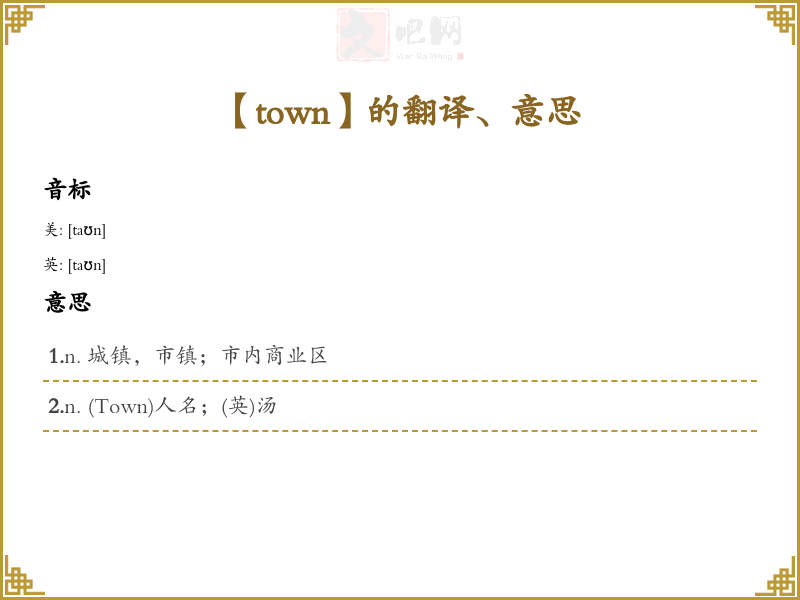【town】的翻译、意思
时间: 2025-04-26 13:22:40
【town】怎么读
美:[taʊn]
英:[taʊn]
【town】是什么意思、字义解释
1. n. 城镇,市镇;市内商业区
2. n. (Town)人名;(英)汤
【town】的详细解释
英文单词学*与分析:[town]
-
基本定义:
- 字面意思:指一个较小的居住地区,通常比城市(city)小,包含居民、商店和其他设施。
- 定义:A town is a human settlement that is smaller than a city but larger than a village, typically having its own local government and services.
-
词源与起源:
- 词源分析:该词源自古英语“tūn”,意指围墙或围住的地方。词根“tun”在古德语和古法语中也有类似的意思。
- 历史背景:该词的首次记录可以追溯到公元前7世纪,用于描述古代的居住区和城镇。
-
使用场景:
- 正式与非正式语境:
- 在正式语境中,"town"常用于法律、地方治理等场合。例如:“The town council will meet next week.”(镇议会下周将召开会议。)
- 在非正式语境中,"town"可以用于日常交流:“I live in a small town.”(我住在一个小镇。)
- 特殊场合:在法律文书中,"town"可能指特定的法律管辖区,例如:“The town is responsible for maintaining public parks.”(该镇负责维护公共公园。)
- 正式与非正式语境:
-
示例句子:
- The town has a beautiful park where families can gather.
这个小镇有一个美丽的公园,家庭可以在这里聚会。 - Many towns have local festivals to celebrate their culture.
许多城镇都有当地的节日来庆祝他们的文化。 - The town hall is an important place for community meetings.
镇政府是社区会议的重要场所。 - She moved to a quiet town to escape the city life.
她搬到一个安静的小镇以逃离城市生活。 - The town was founded in the early 1800s.
这个小镇成立于19世纪初。
- The town has a beautiful park where families can gather.
-
同义词与反义词:
- 同义词:village(村庄),borough(自治市),community(社区)。这三个词的区别在于“village”通常更小且人口更少,"borough"通常是指有自治权的区域,而"community"则更广泛,指的是生活在某个区域内的人群。
- 反义词:city(城市),metropolis(大都市)。“City”指的是更大的人口和基础设施,而“metropolis”通常指的是一个大城市及其周边地区。
*. *学方法**:
- 音标记忆法:/taʊn/。可以将其分为“t”和“own”,想象一个小镇的主人(own)在管理他的土地。
- 词根记忆法:记住“tun”的意思是围住的地方,可以帮助联想到小镇的围墙。
- 谐音联想记忆:想象一个小镇的名字“汤镇”(town),与“汤”谐音,联想成一个温暖和睦的地方。
- 关联词汇:
- local(当地的)
- community(社区)
- council(理事会)
- residents(居民)
- neighborhoods(邻里)
- businesses(企业)
这些信息将有助于更全面地理解和记忆“town”这个词。
【town】例句
1、[N-COUNT] A town is a place with streets and buildings, where people live and work. Towns are larger than neighbourhoods and smaller than cities. In informal English, cities are sometimes called towns. 城镇
-
例:...the northern California town of Albany.…加利福尼亚北部的奥尔巴尼镇。
2、[N-COUNT] You can use the town to refer to the people of a town. (某一城镇的) 居民
-
例:The town takes immense pride in recent achievements.镇上的居民为最近的成就感到无比自豪。
3、[N-UNCOUNT] You use town in order to refer to the town where you live. (自己居住的) 城镇
-
例:He admits he doesn't even know when his brother is in town.他承认甚至不知道他的兄弟什么时候在镇上。
4、[N-UNCOUNT] You use town in order to refer to the central area of a town where most of the stores and offices are. 市中心
-
例:I walked into town.我走进了市中心。
